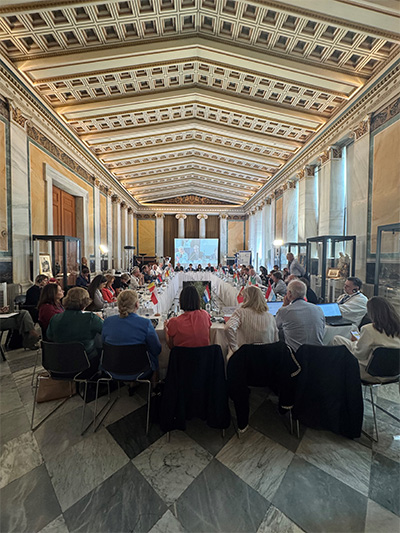
The Presidents of Supreme Courts of EU Members States, Albania, Iceland, Montenegro, Serbia, Ukraine and the United Kingdom convened on today for the Annual Conference to discuss on “The influence of European law on the Supreme Courts” and “The Attractiveness of the Judiciary”. The President of the European Court of Human Rights and the President of the EFTA Court also attend the Meeting.
Mr Anders Eka, President of the Supreme Court of Sweden and President of the Network:
“The task of Supreme Courts is to uphold the rule of law, the cornerstone of democracy. At a time when a cruel and unjust war initiated by the Russian Federation is taking place on the European soil and democratic values are daily put to test it is highly symbolic that the Presidents of European Supreme Courts meet here in Athens, the cradle of democracy.
The topics of today’s conference highlight the challenge before the judiciaries. The Supreme Courts do not act in isolation but are in continuous dialogue with European Courts. This implies the need to successfully navigate in the multi-layered European legal order, not always an easy task. Also, the Supreme Courts, like all other institutions, compete for the most talented people. Today, we will reflect on what can be done to ensure that the Supreme Courts continue to attract highly qualified judges and support staff.”
The working session on the “The influence of European law on the Supreme Courts” prepared and moderated by Mr Christophe Soulard, First President of the French Cour de cassation sheds light on the manner in which Supreme Courts have assimilated European law and, on the impact European law has had on the working methodologies of the courts.
The working session on “The Attractiveness of the Judiciary” prepared by Mr Petr Angyalossy, President of the Supreme Court of the Czech Republic, Ms Danguolė Bublienė, President of the Supreme Court of Lithuania, and Mr Miodrag Đorđević, President of the Supreme Court of Slovenia, examines the key factors influencing the attractiveness of judicial careers, with a particular focus on critical areas such as remuneration, benefits, social security, special obligations, performance evaluation, selection and promotion procedures.